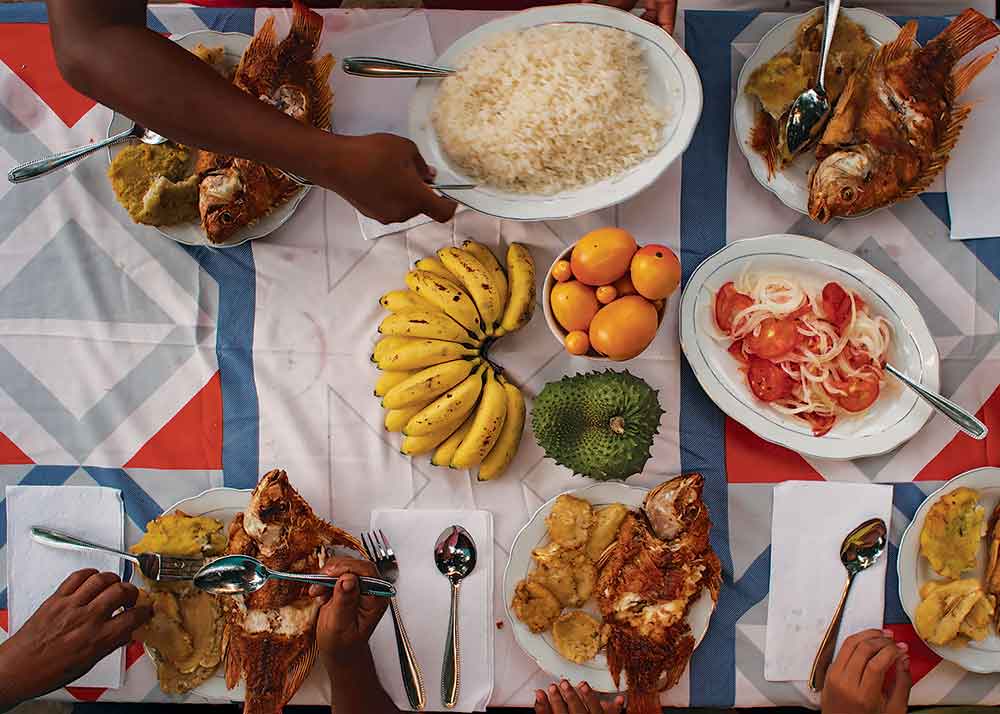Celeb chef René Redzepi dishes on his new docuseries — which examines our relationship with food by honing in on the key ingredients that have shaped humanity across generations
A documentary series about food and sustainability in the 21st century is more likely than not going to focus on what one shouldn’t eat. But in the hands of world-renowned chef René Redzepi, the culinary world is all about treasures meant to be shared. “I don’t believe in scare campaigns,” says the founder of three-Michelin-star restaurant Noma. “It never worked from childhood on. To have your parents tell you, ‘Don’t do this’ — you’re still going to go stick your finger in that hot oil, or whatever it is. It needs to be a conversation.”

Omnivore, an eight-part series created by the restaurateur with Anthony Bourdain’s longtime producer Matt Goulding, investigates ingredients we can’t live without — salt, coffee, corn and rice, to name a few — and the expert hands these precious raw materials pass through before they end up on our plates. “We want to inspire people and make them realize that food is by far the most important thing in our lives,” says Redzepi. “How we eat determines how healthy we are and how we grow. And our food more or less determines how healthy the planet is.”

The idea of a visual feast that would inspire viewers to think more about the sourcing of their ingredients has been percolating in the minds of Goulding and Redzepi for the better part of a decade. “I was fortunate enough to work with Anthony Bourdain, who was a hero for me and a lot of us. He certainly opened up a portal into the importance of food for a lot of people,” says Goulding. “After his passing, René had been getting closer and closer to the moment when he was ready to make TV. René, from the very beginning, was like: ‘This is not about me or my journeys around the world, this is about food and why it’s the most important thing.’ We want to build it that way; understanding the natural world, but rather than animals, let’s look at ingredients and what those ingredients say about the strangest animal of all — us?”

So adamant was Redzepi not to be the face of the series, that he gave himself and the production team a minute-count for how often he wanted to be present on screen. “A maximum of three minutes on camera per episode,” he says, laughing. “I’m that type of person. I need these parameters. I think we managed, more or less, and I’m very, very happy about that. I think we make sure to focus on the essentials — the ingredients and nature and the people there.” In fact, instead of the face of Omnivore, Redzepi considers himself the conductor. “We want to make sure that we tell the world about how amazing food is, and I’m there as a guide, not a host, to push things along so that people feel like, ‘I understand where I’m at and what’s going on.’ ”

The chosen ingredients are a mix of foods that have shaped humanity and some that shape us as individuals. “We went back and forth forever. There’s hundreds of possibilities,” says Goulding. “You want to have culture-shaping staples, so you have corn and rice that humanity has forever been altered by. But we also wanted things that say something really interesting about us. In the case of chili pepper, why is it that we’re the only species besides birds who don’t have capsaicin receptors that eat this spicy fruit? It turns out that we really like having these experiences. We like this form of what’s called benign masochism.”

Redzepi also wants the show to raise more interest in where one’s own food hails from. “This is for you to perhaps think, ‘I never knew that food was so impactful. I never knew there were 40, 50 hands touching my coffee for me to buy it at the gas station for a dollar.’ Or, ‘I can order a different type of coffee, and it has real effect,’ as we see in the specialty coffee episode in Rwanda. It’s meant to inspire people.”

Aesthetically, the series also wants to try something new — a Michelin-starred version of the food documentary, if you will. “What we wanted to do aesthetically was really have those big, beautiful soaring landscape shots that show the immensity of food and how it shapes our landscape and, at the same time, being able to drill down and give you an incredible recipe, a mouthwatering moment of deliciousness,” says Goulding. “We’re going to make this cinematic and immersive and big, and hopefully people will be entertained.”

And now that he has dipped his toe into the world of filmmaking, with this series and a cameo on The Bear, can Redzepi be convinced to step out of the kitchen again for another TV project? “My main jam is cooking,” he says. “But my second tiny glass of jam is definitely doing things like Omnivore.”
Omnivore, streaming on Apple TV+
